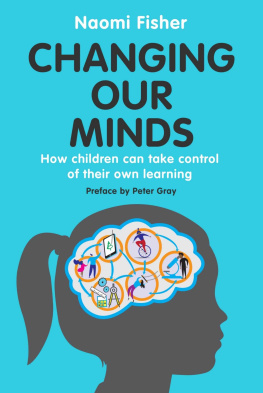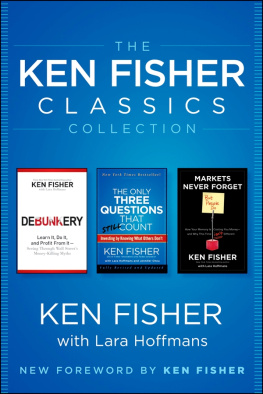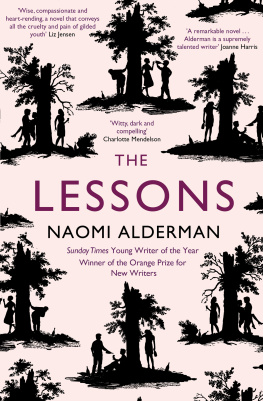Naomi Fisher - Changing Our Minds
Here you can read online Naomi Fisher - Changing Our Minds full text of the book (entire story) in english for free. Download pdf and epub, get meaning, cover and reviews about this ebook. year: 2021, publisher: Little, Brown Book Group, genre: Children. Description of the work, (preface) as well as reviews are available. Best literature library LitArk.com created for fans of good reading and offers a wide selection of genres:
Romance novel
Science fiction
Adventure
Detective
Science
History
Home and family
Prose
Art
Politics
Computer
Non-fiction
Religion
Business
Children
Humor
Choose a favorite category and find really read worthwhile books. Enjoy immersion in the world of imagination, feel the emotions of the characters or learn something new for yourself, make an fascinating discovery.
- Book:Changing Our Minds
- Author:
- Publisher:Little, Brown Book Group
- Genre:
- Year:2021
- Rating:4 / 5
- Favourites:Add to favourites
- Your mark:
- 80
- 1
- 2
- 3
- 4
- 5
Changing Our Minds: summary, description and annotation
We offer to read an annotation, description, summary or preface (depends on what the author of the book "Changing Our Minds" wrote himself). If you haven't found the necessary information about the book — write in the comments, we will try to find it.
Changing Our Minds — read online for free the complete book (whole text) full work
Below is the text of the book, divided by pages. System saving the place of the last page read, allows you to conveniently read the book "Changing Our Minds" online for free, without having to search again every time where you left off. Put a bookmark, and you can go to the page where you finished reading at any time.
Font size:
Interval:
Bookmark:
Dr Naomi Fisher is a clinical psychologist and mother of two self-directed learners. She has a Doctorate in Clinical Psychology and a PhD in Developmental Cognitive Psychology, focusing on autism. She combines years of hands-on experience of self-directed education with an in-depth knowledge of the psychology of learning and wellbeing. Her work has been published in The Green Parent, The Psychologist, SEN Magazine, Juno and Tipping Points. She is a regular speaker on self-directed education, presenting at the Freedom to Learn Forum and the Homeschooling Summit, and is featured on podcasts including The Emotional Curriculum, Off-Trail Learning and Lockdown Learning. She lives in Hove, England, with her family.

Justine Desmond Photography

ROBINSON
First published in Great Britain in 2021 by Robinson
Copyright Naomi Fisher, 2021
The moral right of the author has been asserted.
All rights reserved.
No part of this publication may be reproduced, stored in a retrieval system, or transmitted, in any form, or by any means, without the prior permission in writing of the publisher, nor be otherwise circulated in any form of binding or cover other than that in which it is published and without a similar condition including this condition being imposed on the subsequent purchaser.
A CIP catalogue record for this book is available from the British Library
ISBN: 978-1-47214-550-5
Robinson
An imprint of
Little, Brown Book Group
Carmelite House
50 Victoria Embankment
London EC4Y 0DZ
An Hachette UK Company
www.hachette.co.uk
www.littlebrown.co.uk
For Abel and Jessamy, who show me what a self-directed education really means.
Thank you first to the editorial team at Robinson and particularly Andy McAleer who has been inspiring and encouraging all the way along.
I was inspired by all the children I met in Britain and France who refused to give up their autonomy in the name of education. Their spirit is the power behind this book.
So many people helped me develop my thinking during the writing of this book. Some made the time to talk with me formally, while others read my articles, chatted online or in person.
My interviewees were Blake Boles, Kevin Currie-Knight, Rebecca English, Pat Farenga, Peter Gray, Harriet Pattison, Gina Riley and Alan Thomas. They all pointed me in new directions and expanded my thinking, and their influence went far beyond the quotes you read in the book. Their generosity made it possible. Any errors are entirely my own.
Blake Boles also read an early draft of the book and was consistently encouraging, for which I thank him. Without him, it might never have got this far. Alexander Khost encouraged me to write.
Without Kezia Cantwell-Wright, Laura McAleer and Heidi Steel, this book would never have been more than a pipe dream. They all encouraged me in different ways, and were happy to keep discussing just how this type of education actually works, way beyond when others would have gone to bed.
I have been lucky to have met some inspirational and challenging educators along the way with whom I could debate ideas, even when we vehemently disagreed. I apologise if I have forgotten anyone and I thank you all for keeping me thinking: Jane Clossick, Emma Forde, Nicola Gallie, Lucy Green, Sally Hall, Geraldine Homewood, Ailbhe Hurley, Juliet Kemp, Carole Lovesey, Elizabeth Mills, Kari Mller, Angie Mullin, Rebecca Pennington, Francesca Brooker-Rao, Sue Reid, Kate Robson, Parvine Shahid and Saskia Takens-Milne.
Id also like to thank Katharine Thoday for many fruitful and animated discussions about how things could be different, and Rebekah Lattin-Rawstrone for encouraging me to take writing seriously.
I thank all the contributors to the final chapter; they are named there and further details are included if you would like to read more of their writing.
Lastly, I would like to thank my family. I am so lucky to have them. My parents, Jane and Simon, encouraged me never to assume that just because everyone else does something it is the right thing to do. My sisters, Susie and Abi, are a source of constant support and encouragement; and my brother, Jonah, works tirelessly to prevent us all from falling into an echo chamber.
My children, Abel and Jessamy, show me daily how much more I have to learn about self-directed education, and how schooled my thinking continues to be. Jonnys support has meant everything as we follow this unconventional path, even though it would have been so much easier to ignore the questioning and follow the system. Without you, none of it would have happened. Thank you.
This book contains case studies of children and families. These children are not real; I have created illustrative examples. While all the things I describe have happened, they have not all happened to a particular child who I have met. Any resemblance to a real person is purely accidental.
In the UK, the term commonly used for children educated outside school is home education and this term is enshrined in law. Many home educators in the UK feel very strongly about using this term rather than home schooling as it makes it clear that they are not attempting to replicate school at home and that education is not the same as school. I have used this term throughout this book. In the USA and in other countries, the official term is home-schooling and this is the term that Peter Gray has used in his Preface.
by Peter Gray, Research Professor of Psychology and Neuroscience at Boston College
There was a time when I was inclined to believed that parents have a lot of control over who their children become. I had studied psychology as an undergraduate and the consistent message was that people are shaped by their environment. Parents have a good deal of control over the environment of their children, so parents shape their children. Right? Well, no, not really.
When I was twenty-five, very shortly after my undergraduate days, my son entered the world and my old view was turned upside down. Here was this little guy, who clearly was already his own person. I could do things that helped him be happy, or unhappy, but I couldnt change who he was. I didnt catch on right away but, over time, he taught me that my job as a parent was not to shape him but to get to know him. Who is he? What does he need and want? How can I provide it? How must I change to get along with this individual? He clearly was shaping me more than I was shaping him. And now, after decades of research into child development, Im more convinced than ever that the job of parents is to get to know their children, to learn from them what they need, to provide for those needs, and to help them find the places in the world where they can be the kind of person that they want and maybe need to be.
Naomi Fisher perhaps from her experiences as a clinical psychologist who has worked with many children and families, and perhaps from her experiences as a parent understands this very well. This book is about childrens education outside of conventional schooling, so you might think it is about how children learn from parents. Well, it is a little bit about that, but its much more about how parents learn from children. Changing our minds means evolving from the belief that children are passive recipients of lessons and behavioural shaping to the understanding that children, from the moment they are born onward, are actively creating themselves. Learning, real learning, the kind that sticks and has an impact on a persons life, is always generated from within. The child (and later the adult) is, at every moment, trying to make sense of the world. That sense has to be generated from within, otherwise it is nonsense and is either quickly forgotten or remembered only as trivia. Nobody knows how another person makes sense of the world or what aspect of the world that person is ready to make sense of at any given time. That is why education, real education, is always self-directed. Or at least self-chosen. Sometimes, a self-directed learner will freely choose to have another person direct some aspect of their education. But even then, the learner is in charge. He or she chose to enlist the help of the teacher and he or she can quit at any time.
Next pageFont size:
Interval:
Bookmark:
Similar books «Changing Our Minds»
Look at similar books to Changing Our Minds. We have selected literature similar in name and meaning in the hope of providing readers with more options to find new, interesting, not yet read works.
Discussion, reviews of the book Changing Our Minds and just readers' own opinions. Leave your comments, write what you think about the work, its meaning or the main characters. Specify what exactly you liked and what you didn't like, and why you think so.






